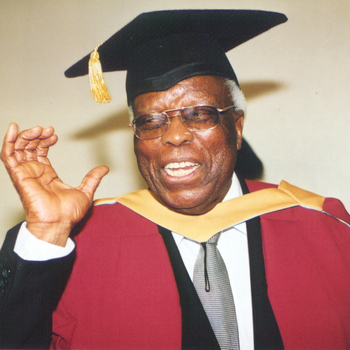DOCTOR OF PHILOSOPHY (HONORIS CAUSA) (POSTHUMOUS)
 Raymond Mhlaba (“Oom Ray”) was born on the 12th of February 1920, in Fort Beaufort in the Eastern Cape. He attended Healdtown Comprehensive School, but was eventually forced to drop out because of financial problems. In 1942, after leaving school, he began working at a dry cleaning factory in Port Elizabeth. It was during this time that he formed his political views, and also became committed to the labour struggle as a trade unionist. He eventually joined the Communist Party of South Africa and became the District Secretary of the Port Elizabeth branch until it was banned in 1950. He was also Chairman of the African National Congress from 1947 to 1953.
Raymond Mhlaba (“Oom Ray”) was born on the 12th of February 1920, in Fort Beaufort in the Eastern Cape. He attended Healdtown Comprehensive School, but was eventually forced to drop out because of financial problems. In 1942, after leaving school, he began working at a dry cleaning factory in Port Elizabeth. It was during this time that he formed his political views, and also became committed to the labour struggle as a trade unionist. He eventually joined the Communist Party of South Africa and became the District Secretary of the Port Elizabeth branch until it was banned in 1950. He was also Chairman of the African National Congress from 1947 to 1953.
After the banning of the ANC, Mhlaba, as well as other exiles, obtained military training. He returned to South Africa in 1962, and commanded Umkhonto we Sizwe until 1963, when he was arrested and sentenced to life imprisonment at the historic Rivonia Trial, along with Nelson Mandela and others. He was to spend 25 years of his life in prison. In 1991, he was elected to the ANC National Executive as well as the SACP Central Committee. In 1994, he became the Premier of the Eastern Cape. Mhlaba also received the ANC’s highest award, Isithwalandwe. In 1995, he became the SACP National Chairperson, and became the High Commissioner to Uganda and Rwanda, until his retirement in 2001.
He released a book of his memoirs in 2001. His contribution to South Africa is recognised by this university by the creation of the Raymond Mhlaba Research Unit of Public Administration and Leadership and the annual Raymond Mhlaba Memorial Lectures.
Raymond Mhlaba was the recipient of two honorary doctorates. The first from the former Port Elizabeth Technikon in 2002 and the second (posthumously) in 2005 from Nelson Mandela Metropolitan University in recognition of his honesty, integrity, courage and commitment to freedom of expression, strong leadership and lasting contribution to an understanding of the struggle for democracy in South Africa. He passed away in February 2005, in Port Elizabeth.